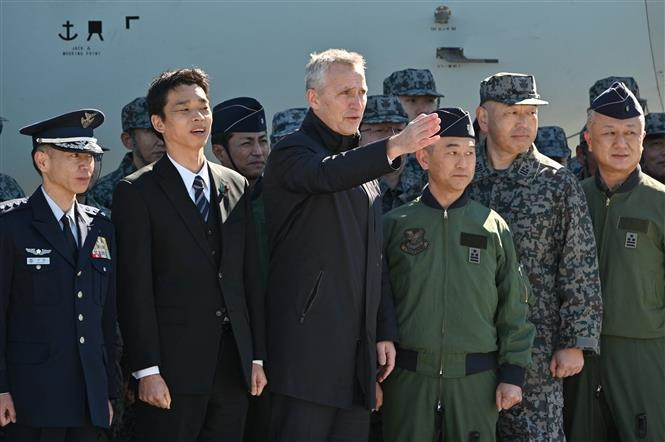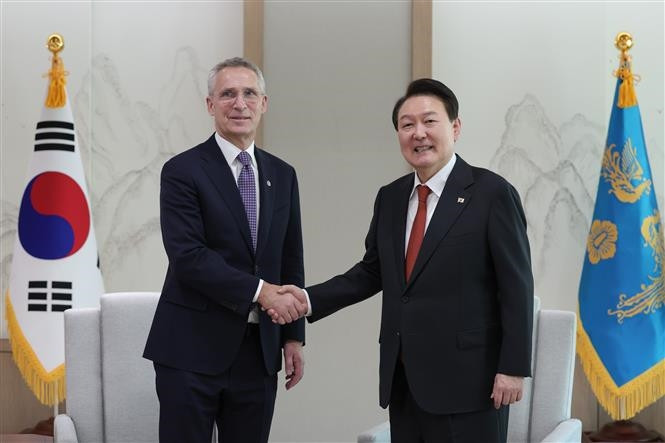The visit to South Korea and Japan by the head of the North Atlantic Treaty Organization (NATO) this week highlights the military bloc's strategic priorities.

NATO Secretary General Jens Stoltenberg (center) during a visit to Iruma Air Base, Japan, January 31. Photo: AFP/ VNA
According to DW (Germany), this strategic priority is to address threats from China and North Korea as well as the global impact of the Russia-Ukraine conflict while seeking to strengthen NATO's political relations with leading Asian allies.
NATO's challenge is 'global'
Mr. Stoltenberg began his visit to South Korea on January 29 and was welcomed by top South Korean officials in Seoul. During a meeting with South Korean Foreign Minister Park Jin, Mr. Stoltenberg raised North Korea's "nuclear and missile programs.
NATO's secretary general said he believed North Korea was helping Russia in its conflict with Ukraine, highlighting how Europe and Asia were "intertwined". However, both North Korea and Russia have denied that Pyongyang is helping Moscow.
Mr. Stoltenberg also called on South Korea to "step up its military support" for Ukraine and urged Seoul to give the green light to direct arms exports, changing its rules on sending weapons to conflict zones.
South Korea has been supporting Ukraine with non-lethal aid. It has also signed arms deals to supply tanks and fighter jets to NATO member Poland. However, the South Korean president has reiterated that supplying weapons to countries in conflict is against the country's policy.
"We need to address global threats and challenges, including those from China, and one way to do that is to work more closely with our regional partners," Stoltenberg told Yonhap news agency. The NATO chief is scheduled to hold more security talks with Japanese Prime Minister Fumio Kishida and other officials in Tokyo later this week.
Jim Townsend, of the Center for a New American Security, described Stoltenberg's Asia trip as one of "reassurance" to Asian partners. "The timing of Stoltenberg's visit is important. The conflict in Ukraine has affected Asian countries, and China's close relationship with Russia is also a threat that needs to be addressed. Stoltenberg's presence in Tokyo shows that NATO wants to strengthen its partnership with Asia. These visits also demonstrate unity because they show that NATO and Asia are willing to work together. This event signals a stronger partnership to find ways to counter the influence of China, North Korea and Russia in Asia."
Tensions rise in Asia

South Korean President Yoon Suk-yeol (right) meets with North Atlantic Treaty Organization (NATO) Secretary General Jens Stoltenberg in Seoul on January 30. Photo: YONHAP/VNA
At the 2022 NATO summit in Madrid, the leaders of Japan and South Korea expressed the urgency of addressing challenges in East Asia. Kishida then expressed the possibility of conflict in East Asia amid China’s military buildup and growing presence in the East China Sea and the South China Sea. South Korean President Yoon Suk-yeol also shared a similar view. Along with the leaders of Japan and Australia, he expressed the importance of improving security in the Indo-Pacific region with NATO. South Korea also opened a diplomatic mission to NATO a few months after the summit.
Professor Ramon Pacheco Pardo at King's College London (UK) commented that building a closer relationship with NATO is "a necessary military strategy" for both South Korea and Japan in the current situation.
“Both Japan and South Korea have expressed that security in Europe is linked to Asia,” said Professor Ramon Pacheco Pardo. According to him, South Korea and Japan want to focus on building partnerships in the fields of maritime security and cybersecurity in the Asia-Pacific region. “NATO is also always looking to engage more with its partners in Asia and use their expertise in cyber technology and military intelligence that can be used to address challenges from China or North Korea,” he added.
North Korean state media called Mr Stoltenberg's visit "a prelude to confrontation and war as it brings dark clouds of a 'new Cold War' to the Asia-Pacific region".
“For NATO, this visit is absolutely a reassurance to the Korean people and the Japanese people, to let them know that they have friends in Europe and the United States who care about the security of this part of Asia,” Mr. Townsend analyzed.
According to Tin Tuc Newspaper